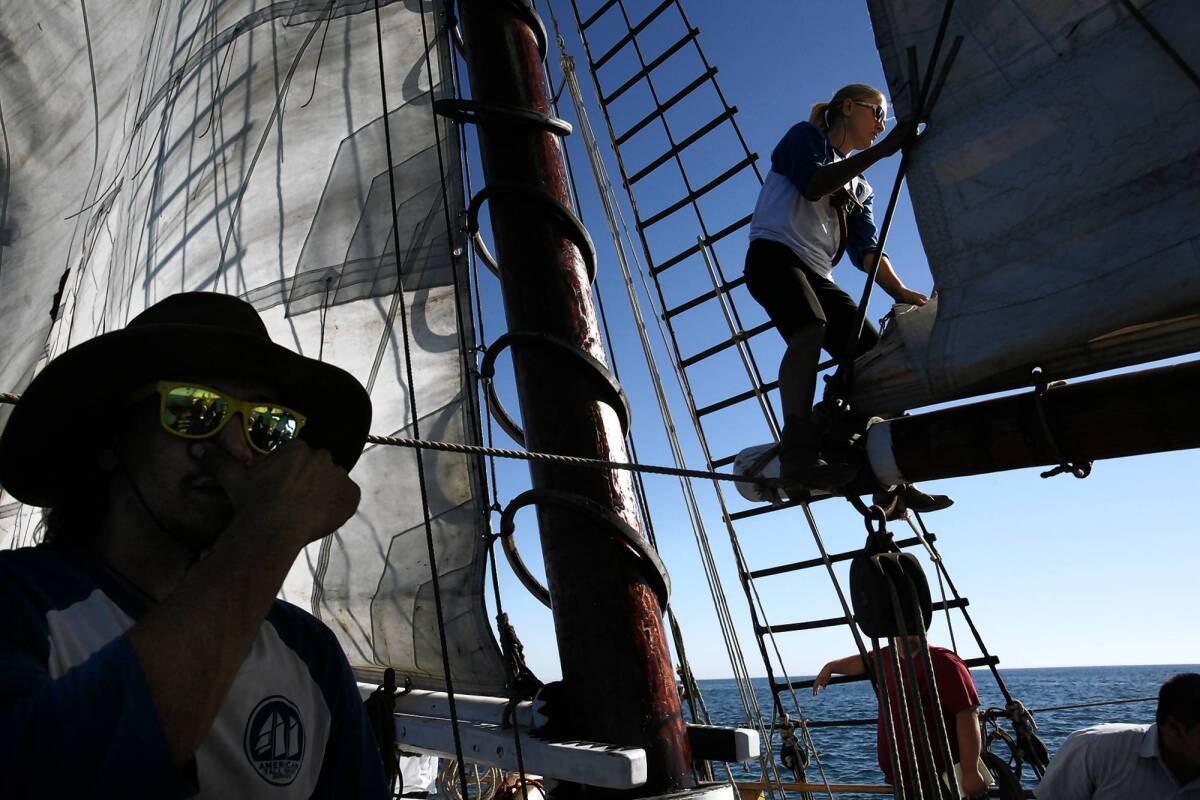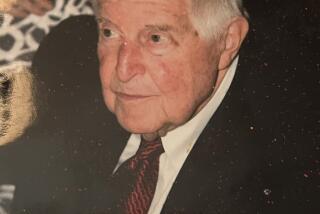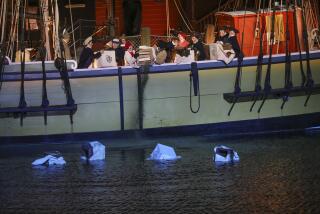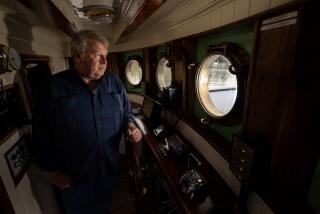Aboard the Bill of Rights, an amended life

The 160-ton schooner rocked in the choppy waters at the mouth of the Channel Islands Harbor, and Donna Reed swung on her high-heeled cowgirl boots between ropes that dangled like vines, untying the cords that bound the sails to masts as thick as utility poles.
Reed swung again as the sails unfurled, balancing the soles of her boots on a rope several feet above the deck. Her movements were quick and precise, as if she were an old pro.
Yet not even a year ago, the 33-year-old was living in landlocked Columbia, S.C., working as a real estate agent and hosting a political talk show that aired on radio stations across the state. She lived in a luxury apartment. Her car had the requisite leather seats.
Now her wages are $150 a week. Her quarters are the size of a closet. And the canary-yellow North Face jacket she just bought from the thrift store still has the $1.99 tag on it.
She’s found a new life aboard the Bill of Rights, an aging tall ship that its operator sees as an educational vessel not just for the students who join it on trips like this, but for the crew: physics and environmental science majors fresh from college, a marine biologist who had run out of money traveling in Mexico and Central America, a massage therapist and musician among them. A geologist born in Kolkata, India, just joined them by way of South Carolina.
Their lives in transition, they all had found their way to the Oxnard harbor where the schooner docks.
“Sometimes, if you keep running into a wall,” Reed said, “you have to change direction.”
::
When Stephen Taylor found the Bill of Rights in 2007, it had been neglected. The wood on the once-majestic ship, built in 1971, was dry-rotting. The generator didn’t run. The engine wasn’t in good enough condition to handle the sea.
“It was pretty rough,” he said.
Taylor, who had spent his career piloting private boats, dove into reinvigorating the Bill of Rights, imagining it as a classroom on the sea. Now, students can learn marine biology, sailing and even leadership on treks as short as a single afternoon or on excursions that last for days.
He started a nonprofit called the American Tall Ship Institute, which funds itself through charter trips, charging private schools for excursions and grants.
When it came time to form a crew, he operated on this premise: You can teach anyone to sail.
He sought professionals, academics and artists whose various backgrounds could offer something different to students and the fledgling operation in exchange for room and board. Some collect a small salary.
They typically sign three-month contracts. Some have shorter stays; many hang around much longer. But after about a year, Taylor will nudge them to move on.
“You get caught up in the awesomeness,” he said, “and you completely forget that the rest of your life has stopped outside of this.”
Many of the crew members found the ship through word of mouth, from friends who had worked on the ship. Taylor also posts to job boards for educators and on other sites.
As for Reed, she had unloaded most of her possessions at the start of the year and left to bicycle through Europe. She ran out of money in Spain.
To chart her next move, she visited a website for professionals seeking to flee the corporate world called escapethecity.org, where she found the Bill of Rights and reached out to Taylor.
As she waited, she found a job in Orange County, a lucrative sales position with a real estate website. She was two weeks in when Taylor asked her to come up for a weekend sail in June.
She went back to her cubicle that Monday and couldn’t take it. She quit and joined the crew.
::
It didn’t take long for Reed to become the second-most senior member of the crew of six living on board. The first mate, Zac Butko, a recent physics graduate from UC Santa Cruz, has two weeks on her.
They had developed a chemistry. Philip Taylor, the captain’s brother and a musician, would strum on his guitar and sing a Bob Dylan song during a break from work. Maureen Maloney — the education director on board, known by everyone as Mo — would pick up a harmonica and play along.
They carpooled on their day off to get pho at their favorite Vietnamese place, where Philip doused his soup with sriracha sauce and slices of jalapeno to make it as spicy as he could, or walk over at the end of the day to the bar with the $3 drafts at the Oxnard marina. They brought along the two dogs, Peanut and Hopi, whose paws click-clacked across the wooden deck.
But life onboard, they said, required an adjustment. Sailing novices had to acclimate themselves to the constant motion that gave them a queasy feeling every time they set sail.
They had to learn how to live with one another in such a confined place, where their sleeping quarters were wedged in nooks and crannies below deck and a cabin with a door was prized. They had come to covet their days off — mountain biking, or dancing, or lying on the beach — simply so they could have some space.
“It’s really tight and you have to be cool with a lot of things — and they’re cool with a lot of things,” Reed said. “You have to be forgiving of everything because you have to work with them the next day and trust them with your life.”
::
The jagged edges of the Channel Islands emerged on the horizon, and the water — a shade of sea green so clear it looked like a pool of mouthwash — calmed as the afternoon wore on.
But the jostling waves were too much for some of the high school students on board, who scurried to the side of the ship. The crew instructed the seasick to fix their gaze as far as they could and let the wind wash over their face. That’s the simplest cure.
Everyone else was in the middle of a lesson: Maloney had a group dissecting squid; Maya Sertic, who graduated from UC Santa Cruz in May with degrees in ecology and environmental science, explained the ecosystem and how plastics and other refuse from land were ending up in the ocean.
They were helped out by volunteers who go out with them regularly. Hal Wilder, 94, steered the ship. “I’m not much help with the heavy lifting, but they let me drive!” he said.
He would come for the day from the veterans home in Ventura where he lives.
“The skipper is an exceptional young man,” Wilder said of the 42-year-old captain. “He really knows his business and really knows how to work with people.”
The boat made its way to the dock. The students were excited, and many raised their hands to come back as volunteers. The crew members were exhausted, drenched in sweat, their T-shirts smeared with dirt and the petroleum jelly they use to lubricate the sails.
The captain assembled the crew below deck to take stock of the voyage. There had been a few missteps, he pointed out, but, in all, a success — they had made it back safely, and the lessons had held the students’ attention.
“If you get a few of them paying attention out of all of them,” Philip Taylor said, “it’s worth it. That’s what it is all about.”
::
Once the work was done, the crew relaxed below deck. They were figuring out what to have for dinner, settling on a salad topped with leftover chicken, and resting before the night ahead.
Philip Taylor would head to Ojai, where his band had a gig. Butko and Sertic, tango partners, would go to a nearby Mexican restaurant where they danced into the night.
Reed showered and went up on deck. Dusk had fallen, and the soft light bathed the rows of sailboats docked at the marina.
She knew she wasn’t the same frustrated woman she was a few months ago. She had been “self-absorbed,” obsessed with her career and a materialistic life.
Now, that ambition was being plowed into the institute. She recently decided that she wanted to stay a full year.
“I don’t think I ever want to be that kind of person again,” she said. “I want to work hard and be ambitious, but I want it to mean something.”
She had a guitar. She had gotten a mountain bike. She had been saving for weeks to get the $900 she needed to ship her husky, Riley, to join her onboard. The dog should be coming in a few days.
Then, she said, she will have everything she needs.
More to Read
Start your day right
Sign up for Essential California for news, features and recommendations from the L.A. Times and beyond in your inbox six days a week.
You may occasionally receive promotional content from the Los Angeles Times.






